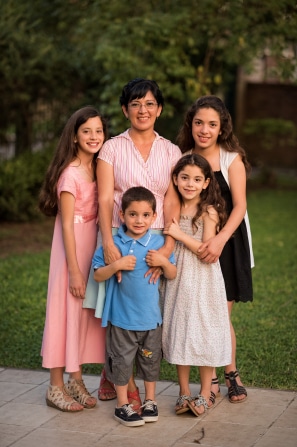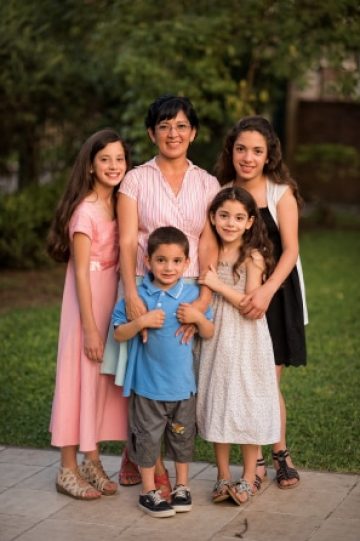Traducción española/Click for Spanish Translation
 When I realized that I was in charge of the write-up for this lesson, given current events in the United States, I admit that I cringed. I was really happily surprised to read the content, which is full of helpful suggestions on how to strengthen your relationships with those you love. I’ve gotten so used to the phrase “Ordained of God” being a prelude to a discussion of same-sex marriage that I was surprised to see a lesson on the family that wasn’t a political stance.
When I realized that I was in charge of the write-up for this lesson, given current events in the United States, I admit that I cringed. I was really happily surprised to read the content, which is full of helpful suggestions on how to strengthen your relationships with those you love. I’ve gotten so used to the phrase “Ordained of God” being a prelude to a discussion of same-sex marriage that I was surprised to see a lesson on the family that wasn’t a political stance.
Consider setting conversational parameters from the outset, particularly if you live in the United States or have many Americans in your class. Specifically asking people to refrain from expressing political opinions or referring to the Supreme Court decision could deter unnecessary side tracking. Alternatively, this lesson could be a good jumping off point to address ways to be more Christlike in our interactions with others, including responses to gay friends and family members. Set the tone for the discussion by acknowledging that, at least in the United States right now, this topic can easily drift off course and you’d like to set off in a specific direction.
Empty Chairs
From the beginning of their marriage, Ezra and Flora Benson made their home and family their top priority. When their children were young, they began emphasizing that they wanted their family to have no “empty chairs” in the eternities . . . May He bless us to strengthen our homes and the lives of each family member so that in due time we can report to our Heavenly Father in His celestial home that we are all there—father, mother, sister, brother, all who hold each other dear. Each chair is filled. We are all back home.
We cannot control what happens to other people in the eternities, but we have often been taught that our homes can be a little piece of heaven on earth. Think about who would sit around your table at a big holiday, if everyone could come.
Why might a family member not feel welcome or comfortable in your home/your company?
How can we make sure that all family members feel fully loved and accepted? How can you show love and acceptance of a person when their choices deeply concern you?
If you have ever felt rejected, were you able to make peace within yourself or with the other person? How?
Choosing Loyalty
One word that I noticed repeatedly in the lesson was loyalty:
They shared an absolute trust in each other, which they felt was one of the great strengths of their marriage. “I have never, never had any question about Flora’s loyalty,” President Benson said.
Our parents instilled deep feelings of loyalty and love among us children,” son Mark said. “I don’t think that kind of atmosphere is generated naturally in a home, but is encouraged and promoted by a concerned and loving mother and father.
Husbands and wives who love each other will find that love and loyalty are reciprocated. This love will provide a nurturing atmosphere for the emotional growth of children.
What does it mean to you to be loyal?
How can you reconcile the ideal of loyalty when reality may offer hurt, betrayal or other painful circumstances?
How can loyalty to God help us with our family relationships?
Working together
The scriptures tell us: “Adam began to till the earth … as I the Lord had commanded him. And Eve, also, his wife, did labor with him. … They began to multiply and to replenish the earth. … And Adam and Eve, his wife, called upon the name of the Lord. … And Adam and Eve blessed the name of God, and they made all things known unto their sons and their daughters. … And Adam and Eve, his wife, ceased not to call upon God.” (Moses 5:1–2, 4, 12, 16.)
From this inspired record we see that Adam and Eve provided us with an ideal example of a covenant marriage relationship. They labored together; they had children together; they prayed together; and they taught their children the gospel—together. This is the pattern God would have all righteous men and women imitate.
I really liked this quote because it emphasizes that a family is a team that works together. To me it is refreshing when so often we really focus on how gender roles are separate and distinctly defined. Here President Benson teaches that the work of a family should be shared by everyone. The adults in a family have a shared obligation to labor, to care for children, to call on God for help and to teach the Gospel. He did not specify the exact form of labor that each should undertake, because everyone has an obligation to care, to teach and to work.
Sister Chieko Okazaki offered an analogy for sisterhood in a talk called “A Living Network” that also applies to families. She described her father’s fishing net and likened it to our relationships.
This is also what happens when we cherish each other, watching over and taking care of each other. We can’t prevent rips and damage any more than my father could always keep the net away from rocks when he cast; but we can make sure that we tend and mend our own network, every time we use it, and every time there is damage. (Chieko Okazaki November 1995 Ensign “A Living Network”)
When in your life have you been able to tend and mend your network?
What types of rips or damages have you experienced in family life? How can we repair wounded family relationships?
All equipment needs maintenance, and a fishing net must be washed of salt water to prevent deterioration.
What examples of maintenance did Pres. Benson mention in his lesson? (Family Home Evening, prayer etc.)
What types of maintenance has been successful in your family?
Have you ever struggled with some of the guidelines Pres. Benson mentioned? How can families adapt prophetic counsel to meet individual needs? How have you successfully done this?
Sister Okazaki also said:
In most congregations of sisters, even in hearts and homes in apparently ideal circumstances, there are hidden heartaches and taxing challenges. At least some among you are survivors of abuse and other crimes of personal violence. Death or divorce can visit any home. Suffering comes from wasted potential, faltering faith, the decisions of a loved one who has used his or her free agency to make terrible choices that have wounded himself or herself and others. In your family, or in the family of someone close to you, is someone dealing with chronic mental, physical, or emotional illness; chemical dependency; financial insecurity; loneliness, sorrow, or discouragement? Many sisters are in second marriages, with the triple challenges of healing from the loss of a first marriage, working to build a strong second marriage, and compassionately providing part-time mothering to children of the husband’s earlier marriage.
Every family, whether struggling with problems that seem perennial or whether blessed by ideal circumstances, is a valuable, cherished, and beloved family. The Savior wants you to succeed. Heavenly Father loves you. We love you. We pray that you may be strengthened, that you may receive the help you need, and that you may extend help to others in need. (Chieko Okazaki November 1995 Ensign “A Living Network”)
I love this quote because Sister Okazaki speaks of specific real evils that people face. I also love the idea that Christ loves your family. We speak often of how God loves each individual, and how Christ helps individuals. But God also loves your family, whatever that may look like. Whether you live by yourself with a cat you love or have ten children, every family “is a valuable, cherished and beloved family.”
What ideas have you had for approaching this lesson?
If someone is determined to engage in controversial subjects how would you guide the topic back in the direction you want to go?
Capítulo 14: El matrimonio y la familia: ordenados por Dios
Spanish translation by Denisse Gómez
Sillas vacías
Desde el inicio de su matrimonio, Ezra y Flora Benson hicieron de su hogar y su familia la primera prioridad. Cuando sus hijos eran pequeños, comenzaron a hacer hincapié en que no querían que en su familia hubiera “asientos vacíos” en las eternidades… “[…] Ruego que Él nos bendiga para que fortalezcamos nuestro hogar y la vida de cada miembro de la familia, para que en el debido tiempo podamos rendir un informe a nuestro Padre Celestial en Su hogar celestial de que todos estamos presentes: padre, madre, hermana, hermano, y todos a quienes amamos; que todas las sillas está ocupadas; que estamos todos de vuelta en casa”
 Nosotros no podemos controlar lo que pasará con las demás personas en las eternidades, pero se nos ha instruido continuamente en que nuestros hogares pueden ser un pedazo de cielo en la Tierra. Piensa en quién se sentaría en tu mesa en una fecha importante, si cualquiera pudiese venir.
Nosotros no podemos controlar lo que pasará con las demás personas en las eternidades, pero se nos ha instruido continuamente en que nuestros hogares pueden ser un pedazo de cielo en la Tierra. Piensa en quién se sentaría en tu mesa en una fecha importante, si cualquiera pudiese venir.
¿Por qué un miembro de tu familia podría no sentirse invitado o cómodo en tu casa o con tu compañía?
¿Cómo podemos asegurarnos de que todos los miembros de nuestra familia se sientan totalmente amados y aceptados? ¿Cómo puedes mostrarle amor y aceptación a una persona cuando sus decisiones te preocupan profundamente?
Si alguna vez te has sentido rechazada ¿Serías capaz de hacer las paces con esa persona o contigo misma? ¿Cómo lo harías?
Elegir la lealtad
Una palabra que noté se repetía en esta lección fue ‘lealtad’:
Tenían absoluta confianza el uno en el otro, y sentían que ése era uno de los elementos positivos de su matrimonio. “Nunca, jamás, he tenido ninguna duda sobre la lealtad de Flora”, dijo el presidente Benson4.
“Nuestros padres inculcaron un profundo sentimiento de lealtad y de amor entre nosotros los hijos”, dijo su hijo Mark. “No creo que ese tipo de ambiente se genere de forma natural en un hogar, sino que lo fomentan y promueven un padre y una madre amorosos y que se interesan”8.
Los cónyuges que se aman se darán cuenta de que el amor y la lealtad son recíprocos. Ese amor proporcionará un ambiente afectuoso para la evolución emocional de los hijos.
¿Qué significa para ti ser leal?
¿Cómo puedes buscar la lealtad ideal cuando la realidad puede responderte con heridas, traición y otras dolorosas circunstancias?
¿Cómo la lealtad a Dios puede ayudarnos con nuestras relaciones familiares?
Trabajando juntos
Las Escrituras nos dicen: “…Adán empezó a cultivar la tierra… como yo, el Señor, le había mandado; y Eva, su esposa, también se afanaba con él. …y empezaron a multiplicarse y a henchir la tierra … Y Adán y Eva, su esposa, invocaron el nombre del Señor … Y Adán y Eva bendijeron el nombre de Dios, e hicieron saber todas las cosas a sus hijos e hijas … Y Adán y Eva, su esposa, no cesaron de invocar a Dios” (Moisés 5:1–2, 4, 12, 16).
En ese registro inspirado vemos que Adán y Eva nos dieron un ejemplo ideal de lo que es una relación de convenio matrimonial. Trabajaron juntos; tuvieron hijos juntos; oraron juntos; y enseñaron el Evangelio a sus hijos juntos. Ése es el modelo que Dios desea que todos los hombres y mujeres justos imiten.
Realmente me gusto esta cita porque enfatiza en que una familia es un equipo que trabaja junto. Para mí esto es refrescante pues continuamente nos enfocamos en como los roles de género están separados y específicamente definidos. Los adultos de una familia tienen la obligación compartida de trabajar, cuidar a los niños, acudir a Dios por ayuda y enseñar el Evangelio. Él no especifica las labores concretas que cada uno deba realizar porque todos tienen la obligación de cuidar, enseñar y trabajar.
La hermana Chieko Okazaki narró una analogía de hermandad en un discurso llamado “Formemos una red viviente” la cual también aplica para las familias. Ella describió la red para pescar de su padre y la relacionó con nuestras relaciones.
Esto también pasa cuando nos apreciamos y nos cuidamos unas a otras. De la misma manera que mi padre no siempre podía evitar las piedras al lanzar la red, tampoco nosotras podemos impedir que a veces haya roturas y daño; pero podemos asegurarnos de cuidar y remendar nuestras redes cada vez que las usemos y cuando estén dañadas.
En tu vida ¿Cuándo has sido capaz de cuidar y remendar tu red?
¿Qué tipo de roturas o daño has experimentado en la vida familiar? ¿Cómo podemos reparar las relaciones familiares dañadas?
Todo equipo necesita mantenimiento y una red para pescar necesita ser lavada para quitar el agua salada y evitar el deterioro.
¿Qué tipo de mantenimiento mencionó el Presidente Benson en su lección? (Noche de hogar, oración, etc.)
¿Alguna vez has utilizado alguna de las directrices que el Presidente Benson mencionó? ¿Las familias cómo pueden adaptar un consejo profético a sus necesidades individuales? ¿De qué manera has logrado esto con éxito?
La hermana Okazaki también dijo:
En la mayoría de las congregaciones de hermanas, aun en aquellas personas y hogares que aparentan ser ideales, existen corazones rotos y grandes dificultades que no se ven; algunas de ustedes son victimas del abuso y otros actos de violencia; la muerte o el divorcio pueden ocurrir en cualquier hogar, el sufrimiento surge del potencial desperdiciado, de una fe que falle, de las acciones de un ser querido que haya empleado su albedrío para tomar terribles decisiones que les hayan hecho daño a el y a otras personas. En su familia o en la familia de un allegado, ¿hay alguien que sufra de enfermedades crónicas mentales, físicas o emocionales? ¿alguien adicto a las drogas o el alcohol? ¿Hay inseguridad económica, soledad, tristeza o desaliento? Muchas hermanas están en segundas nupcias, con la triple complicación de reponerse del fracaso del primer matrimonio, de tratar de edificar un segundo matrimonio fuerte y de ser también madres, aunque sea ocasionalmente, para los hijos del primer matrimonio de su esposo.
Toda familia, ya sea con problemas que parezcan eternos o bendecida por circunstancias ideales, es una familia de valor, preciada y querida. El Salvador quiere que tengan éxito. Nuestro Padre Celestial las ama. Nosotras las amamos. Oramos por que tengan fuerza y reciban la ayuda que necesiten y que puedan prestar ayuda a otros.
Amo esta cita porque la hermana Okazaki habla de específicas adversidades que las personas enfrentan. También amo la idea de que Jesucristo ama a tu familia. Frecuentemente hablamos de como Dios nos ama individualmente y como Jesucristo nos ayuda individualmente pero, Dios también ama a nuestra familia, sin importan cómo ésta sea. Aunque sólo sean tú y tu amado gato o bien, tengas diez hijos, cada familia es “valiosa, preciada y querida”.
¿Qué ideas has tenido para adaptar esta lección?
Si alguien está decidida en centrarse en temas controversiales ¿Cómo la guiarías al tema principal en la dirección que tú deseas?






6 Responses
Nicely done!
Thank you for this insightful lesson!
This is wonderful — thank you! I had been assigned this lesson and was struggling with it.
I will be teaching this lesson this coming Sunday. I have been eagerly looking forward to it as a chance to underscore that while a family may have legal or biological roots but that in its broadest application, family is anyone and everyone who joins together to love, cherish, instruct, respect, honor, and strive to bring out the best in each other. Marriage and family sometimes coincide but are not synonymous. This lesson is a wonderful opportunity to remind each other that we are all part of the human family and that it is our responsibility to care for our entire family. United we stand, divided we fall.
In Ezra Taft Bensons biography it mentioned how his wife would have their daughters dates vacuum a room for her or some other household chore while they wait for their date to be ready. I think it is an awesome idea and if I have daughters will do the same thing. It teaches the boys that house work is not beneath them. I wish the church would share things like this in the lesson. Dont believe read the book.
[…] Relief Society Lesson 14: Marriage and Family — Ordained of God – Ese amor proporcionará un ambiente afectuoso para la evolución emocional … su esposa, no cesaron de invocar a Dios” (Moisés 5:1–2, 4, 12, 16). En ese registro inspirado vemos que Adán y Eva nos dieron un … […]